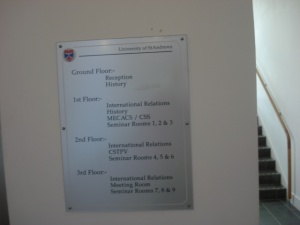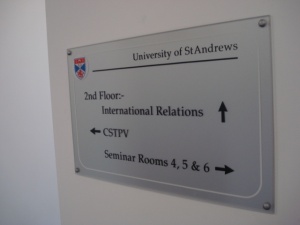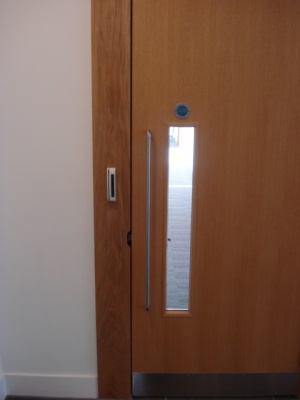Centre for the Study of Terrorism and Political Violence
Centre for the Study of Terrorism and Political Violence is a terrorism research centre based at the University of St. Andrew. It is one of the key terrorology research centres with close links to government, intelligence agencies, corporate security companies and other terrorology centres such as the RAND Corporation.
Contents
Origins and history
CSTPV was established in 1994 by Paul Wilkinson and RAND terrorism analyst Bruce Hoffman. Wilkinson, who was appointed head of St. Andrew's School of History and International Relations that same year, had a long affiliation with the RAND Corporation which dates back to at least the mid-1980s. After being appointed head of the Department of Politics and International Relations at Aberdeen University in 1985, Wilkinson had established The Terrorism Research Unit in the department, which developed a terrorism database in coordination with RAND. [1] At that time RAND's terrorism database was overseen by Brian Jenkins, but in 1989 he was replaced by Bruce Hoffman.[2]
Hoffman left RAND during 1994 to set up CSTPV. The last reference to Hoffman being at RAND was in the New York Times on 6 March that year,[3] and the first reference to CSPTV in the printed press was in the Los Angeles Times that August. Referring to the Oslo Accords, Hoffman told paper that: "As peace takes hold, terrorists will have even more to lose and more motivation to demonstrate their capacity as spoilers."[4] CSTPV is referred to in the article as the "Center for Terrorism and Conflict Studies".
Hoffman became director of the new Centre, whilst Wilkinson was appointed chairman. Another key figure in the group was Magnus Ranstorp, who was studying a PhD on hostage taking in Lebanon at the time the Centre was founded.[5]
CSTPV was originally based at premises at 188 North Street, St. Andrews, which according to Alex Schmid were "hardly more luxurious than those in Bin Laden’s presumed cave."[6] Lord Carlile referred to Wilkinson as working out of an "interesting attic office", presumably in the same premises.[7] When he had important visitors Wilkinson would "receive them at a more stately place in the University."[8]
To broaden its resource and manpower, CSTPV set up an E-learning programme to generate some steady income and to become less dependent on research council grants and other externally funded project-based research. [9]
Location
The CSTPV is currently based on the second floor of the New Arts Building at St Andrews University. It is not prominently advertised and does not even have a plaque on the (security controlled) door to announce its presence. There is no indication outside that the Centre is there, only a sign beside the ground floor lift and a smaller sign on the second floor.
Excerpt from CAMPACC article
In 1993 Bruce Hoffman temporarily left RAND to found the Centre for Studies in Terrorism and Political Violence (CSTPV) at the University of St Andrews. Hoffman is currently an Honorary Senior Research Associate at the CSTPV. Brian Jenkins, a Senior Analyst at RAND who founded the corporation's terrorism research programme in 1972, is currently a member of the CSTPV Advisory Council. The relationship is further strengthened through the collaborative establishment of the RAND-St Andrews database of 'international terrorism incidents'.
The RAND-St Andrews nexus skews understandings of 'terrorism', especially through its pivotal role in the peer review and publishing of research. Members of the Centre and of RAND hold key editorial positions on the two foremost academic journals in the field: Studies in Conflict and Terrorism, and Terrorism and Political Violence. Those journals emphasise political violence directed against states, while largely ignoring violence by states, except those not allied to US or Western European countries - i.e., those described as 'rogue states' by the US government.[10]
Embedded experts define 'terrorism' selectively, with a bias towards US-led alliances and against any resistance. According to Prof. Paul Wilkinson, Director of the CSTPV, extra-judicial assassinations by Israel are 'ruthless acts of counter-terror', i.e. self defence [11]. Within this perspective the USA, the UK and their client states never carry out 'terrorism'.
In a mid-1990s government inquiry on terrorism, Wilkinson emphasised violence by oppressed groups, while ignoring state violence against them. In particular he problematised trans-national support for 'the weak':
- almost any prolonged and significant terrorist campaign is likely to have an international dimension: almost every terrorist group tends to look across the borders of the state where it is based, and further afield, not only for weapons, funds, training and safe-haven, but for any ideological, political or diplomatic support it can manage to obtain; sub-state terrorism is typically the weapon of the weak [12].
Such diagnoses justified permanent anti-terrorist legislation to target the weak.
That report led to the Terrorism Act 2000, which broadened the definition of terrorism. It blurred any distinction between political protest and organised violence, as well as any distinction between ideological and material support. This law redefined terrorism to include simply 'the threat' of 'serious damage to property', in ways 'designed to influence the government' for a 'political cause'. Moreover, it banned organisations on the basis that their activities abroad fit that broad definition, and criminalised any 'association' with such organisations in Britain. After the September 11 attacks, the EU Council redefined terrorism in even broader ways. Predictably, such powers have been used to intimidate (and sometimes prosecute) political opponents of oppressive regimes allied to the UK. These developments ominously bring home to Britain the counter-insurgency theory that was deployed in its colonies, and in Northern Ireland during the 1970s, to counter political revolt.
An associate of the CSTPV, Rohan Gunaratna (2003), has offered expert testimony in UK prosecutions for supposed membership in 'terrorist' groups. In the court case of Meziane, several refugees in Leicester were accused of fund-raising for terrorist activities abroad. After Gunaratna claimed that they were Al Qaeda members, he was challenged by the defence to provide documentation, but he did not. Consequently, the allegations were dropped and he was not recalled as a witness. Neither did the prosecution take up his similar offer in another case against refugees for alleged membership of the Kurdistan Workers Party (PKK). Nevertheless Gunaratna is still quoted as an expert by journalists.
Embedded in the Iraq occupation
Beyond its academic roles, the RAND-St Andrews nexus has close professional links with key political and corporate players in the 'war against terror'. An important example is Bruce Hoffman, founder member of the CSTPV and currently RAND Corporation's key expert on terrorism. In 2004 he was appointed as senior advisor on counter-terrorism and counter-insurgency to the Constitutional Provisional Authority in Iraq. Hoffman argued that the occupation strategy can be successful only if it adopts a British colonial model of counter-insurgency, comparable to perspectives in Frank Kitson's Low Intensity Operations.
The CSTPV also has institutional ties to the private military industry. One example involves founder member of the CSTPV and current Honorary Senior Research Fellow, David Claridge. In 2001 Claridge established Janusian Security Risk Management Limited, a private military intelligence and security company, as a subsidiary of the political risk firm The Risk Advisory Group. The company claimed to be the first Western security firm with an independent operational office and a country manager permanently based in Iraq. In the press statement accompanying its launch, Janusian acknowledges their link with the CSTPV in this collaboration, which 'includes shared access to research, intelligence sources and databases, and the expertise of the Centre's staff, as well as the development of sector-specific studies into areas of political risk'.
Like their antecedents in counter-insurgency theory, present-day embedded experts emphasise techniques for total war against both political and military resistance. Hoffman blames the USA's inadequate planning for the 'insurgency' problem in Iraq. According to him, 'a critical window of opportunity was lost because we failed to anticipate the widespread civil disorder and looting that followed the capture of Baghdad'; this key mistake 'breathed life into the insurgency.' In his analysis, the insurgency originated independently of the invasion; it has no link with the occupiers' activities there.
CSTPV Seminars
CSTPV runs a seminar series on Thursdays attended by academic staff in the University, and is also open to all students of the University. No remuneration is paid to participants save Speakers’ UK travel, one night’s accommodation and meal expenses. [13]
In response to a Freedom of Information request sent to the University of St. Andrews in August 2008, the University sent a document consolidating the documents that were used to advertise the seminars. The University also sent a list of seminars arranged in chronological order.
Conferences
A Freedom of Information request sent to the University of St. Andrews in August 2008, revealed details of conferences and other events held by CSTPV since the 2002-03 academic year. [14] These events are listed below. Each event has a seperate page providing further details where available.
- Islamic Extremism and Terrorism in the Greater Middle East, 7– 8 June 2002
- International Terrorism and Intelligence 2002, 11 October 2002
- International Conference on Terrorism and Human Rights, 13-15 July 2003
- The Washington Conference on Port Security, Maritime Intelligence and Counter-Proliferation, 2004
- International Terrorism and Intelligence 2004, 15 June 2004
- International Terrorism and Intelligence 2005, 17 June 2005
- International Terrorism and Finance 2005, 26 - 27 June 2005
- The International Terrorism and Energy Security Conference, 15 – 16 June 2006
- International Terrorism and Intelligence 2006, 23 – 24 June 2006
- International Terrorism Conference 2007, 13 -14 June 2007
- International Terrorism Conference 2008, 2-3 October 2008
Staff
- Alex Schmid, director
- Paul Wilkinson, Emeritus Professor
- Magnus Ranstorp, former member.
- John Horgan, former member.
- Anthony Richards
- Peter Lehr
- Gillian Mcllwaine, Centre Secretary
- Michael Boyle
- Max Taylor
- Robert Lambert
Advisory Council
- Carl Bildt - former Swedish Prime Minister and UN Envoy for the Balkans
- Scott Campbell - CEO, Informa Group, Washington at its subsidiary Washington Policy and Analysis, Inc.
- Jayantha Dhanapala - Former UN Under Secretary General for Disarmament now Head of Peace Commission, Sri Lanka
- Giandomenico Picco - UN Under Secretary General, Geneva
- William Walker - Head of School of International Relations
- Alex P. Schmid - Erasmus University & UN Terrorism Prevention Branch
- Martha Crenshaw - Professor of Government, Wesleyan University
- Paul Wilkinson - Chairman of CSTPV Advsory Board
- Brian Jenkins - Senior Consultant to President of RAND Corporation, Santa Monica
- Guy Sanan - General Manager, Laureus World Sports Awards
- Magnus Ranstorp - Director of CSTPV, University of St Andrews
2008
- Professor Paul Wilkinson - Chairman of CSTPV Advsory Board
- Mr Carl Bildt - former Swedish Prime Minister and UN Envoy for the Balkans
- Mr Scott L.Campbell - CEO, Washington Policy and Analysis
- Amb. Jayantha Dhanapala - Former UN Under Secretary General for Disarmament, now Senior Advisor to the President of Sri Lanka
- Mr Giandomenico Picco - former UN Assistant to Secretary General, now CEO of GDP Associates
- Dr. Ali Watson, Head of School of International Relations
- Professor Martha Crenshaw - Professor of Government, Wesleyan University
- Mr Brian Jenkins - Senior Consultant to President of Rand Corporation, Santa Monica
- Dr Magnus Ranstorp - Research Director of the Centre for Asymmetric Threat Studies at the Swedish National Defence College
- Dr Guy Sanan - General Manager, Laureus World Sports Awards
- M.J. Gohel - CEO of the Asia Pacific Foundation, London[15]
Other Associates
- Rohan Gunaratna, former member
- Andrew Silke Honorary Senior Research Associate
Funding
- £250,000 from the Economic and Social Research Council to research the Domestic Management of Terrorist Attacks, 2002
- $300,000 from Washington Policy and Analysis, Inc., 2002
Contact, References and Resources
Contact
School of International Relations, University of St. Andrews New Arts Building, Library Park, The Scores St Andrews, Fife, KY16 9AX Scotland, UK
Resources
- Source:Campaign Against Criminalising Communities (CAMPACC), Embedded Experts in the 'War on Terror'
References
- ↑ Alex Peter Schmid, Political terrorism: a new guide to actors, authors, concepts, data bases, theories and literature (Amsterdam; Oxford: North-Holland, 1988) pp.146-147)
- ↑ RAND Corporation News Release, 'BRUCE HOFFMAN TO HEAD RAND’S WASHINGTON OFFICE. LEADING TERRORISM EXPERT RETURNS AS THINK TANK BEEFS UP PROGRAM. ALSO BACK AT RAND: BRIAN JENKINS', 31 August 1998
- ↑ Matthew L. Wald, 'How Does the World Look Through the Eyes Of Aspiring Terrorists?', New York Times, 6 March 1994
- ↑ Los Angeles Times, 'Analysts: Any Jewish group in the world is now a target', The Jerusalem Post, 2 August 1994
- ↑ Magnus Ranstorp's PhD thesis 'Radical Shi'ism in Lebanon: Western government crisis management techniques in dealing with hostage incidents, 1982-1992' was published by the University of St Andrews in July 1995
- ↑ Speech given by Professor Alex P. Schmid on the occasion of Paul’s retrial. Accessed from URL <http://www.st-andrews.ac.uk/~cstpv/about/staffprofiles/pwretiral101007.pdf> on 28 June 2008, 13:47:59
- ↑ Hansard HL Volume 675 Column 1436 (21 November 2005)
- ↑ Speech given by Professor Alex P. Schmid on the occasion of Paul’s retrial. Accessed from URL <http://www.st-andrews.ac.uk/~cstpv/about/staffprofiles/pwretiral101007.pdf> on 28 June 2008, 13:47:59
- ↑ Speech given by Professor Alex P. Schmid on the occasion of Paul’s retrial. Accessed from URL <http://www.st-andrews.ac.uk/~cstpv/about/staffprofiles/pwretiral101007.pdf> on 28 June 2008, 13:47:59
- ↑ Burnett, J. and Whyte, D., Embedded expertise and the "War on Terror", Journal for Crime, Conflict and the Media, 2005, 1(4): 1-18.
- ↑ Wilkinson, P., Terrorism Versus Democracy: the Liberal State Response. London: Frank Cass, 2002, p. 68.
- ↑ Wilkinson, P., Inquiry into Legislation against Terrorism, Vol. 2, 1996, Lord Lloyd of Berwick, Cm 3420, p. 4.
- ↑ Letter (PDF) from the University of St. Andrews in response to a request under the Freedom of Information (Scotland) Act 2002, 3 September 2008
- ↑ Letter (PDF) from the University of St. Andrews in response to a request under the Freedom of Information (Scotland) Act 2002, 3 September 2008
- ↑ Advisory council, accessed 8 May 2008.


